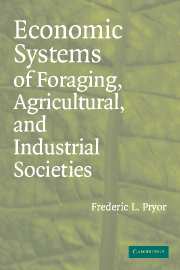1 - Introduction
Published online by Cambridge University Press: 06 July 2010
Summary
An economic system comprises the totality of institutions and organizations that specify property relations within a given society and that channel and influence the distribution of goods and services. This dry definition covers an amazing diversity of economies at all levels of development: the altruistic foragers of the Kalahari Desert in southern Africa; the highly competitive fishing societies on the Canadian Pacific coast; the egalitarian Lepcha farmers of Sikkim; the intricately structured caste agriculturalists in Uttar Pradesh, India; the industrialized market economies of West Europe; and the former centrally planned economies of East Europe.
How can we make sense of this exuberant profusion, which represents a tribute to humanity's ingenuity at organizing itself? In this book, I look at economic systems in a comparative fashion and ask four key questions about them: Is the number of these systems infinite or do particular institutions and organizations consistently cluster together in a few distinct patterns? If such patterns exist, are they a function of the environment, the social or political structure, or the level of economic development; or are they relatively independent entities? What impact do economic systems have on the performance of the economy? How do they originate, develop, and change?
- Type
- Chapter
- Information
- Publisher: Cambridge University PressPrint publication year: 2005
- 1
- Cited by



